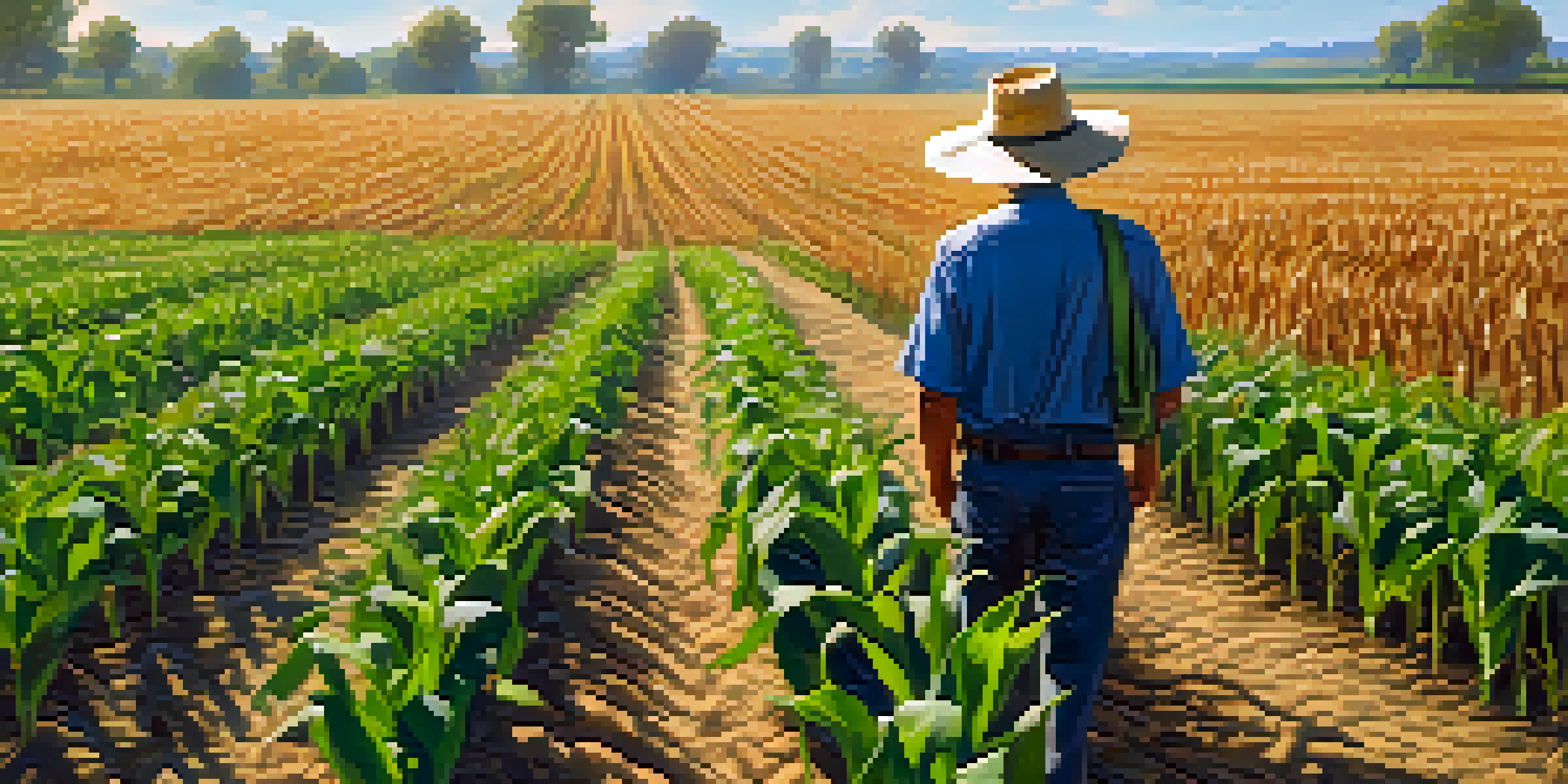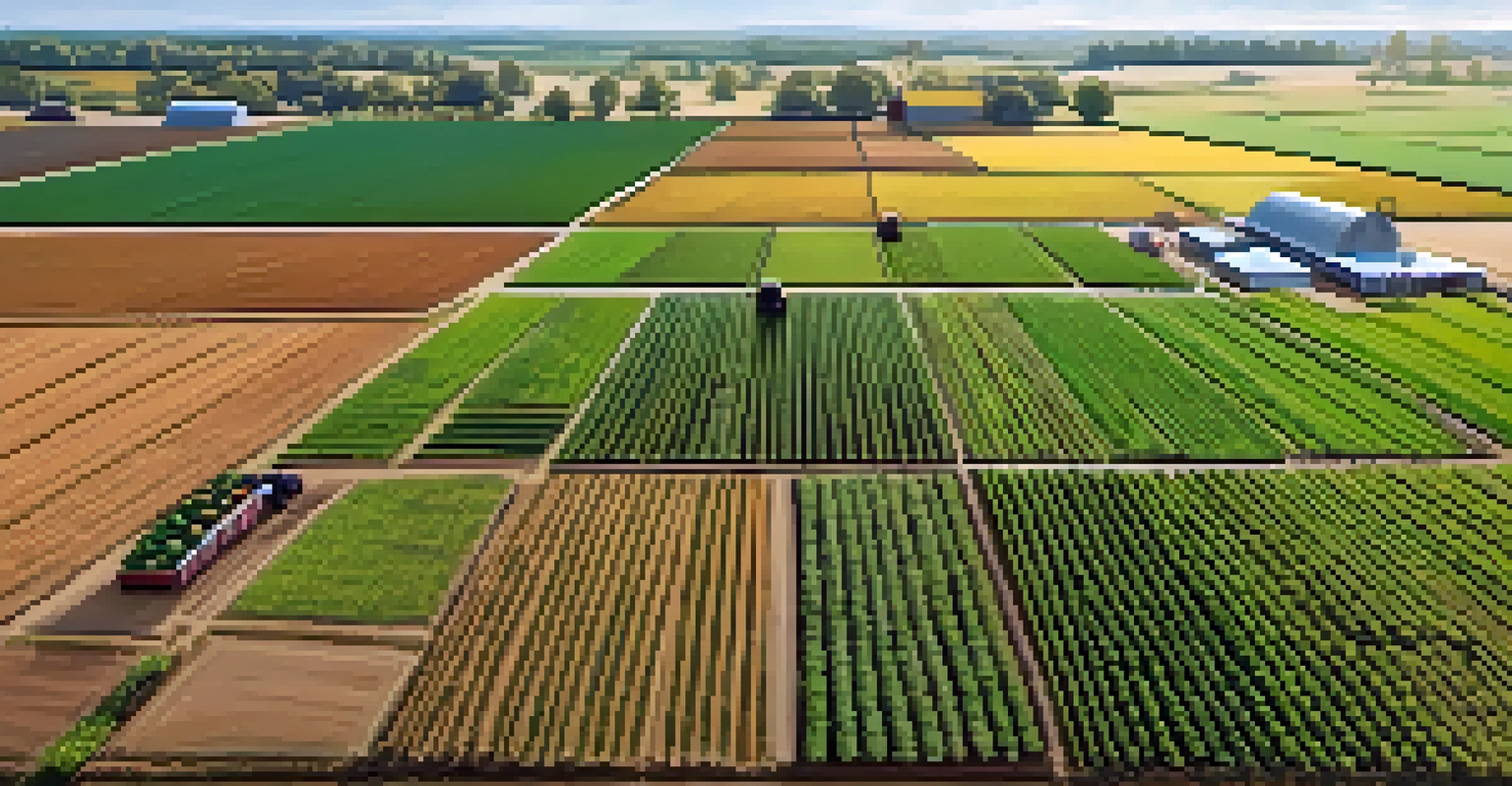Agricultural Challenges Addressed by MSU Research

Understanding the Impact of Climate Change on Agriculture
Climate change poses a myriad of challenges for farmers today, from unpredictable weather patterns to increased pest populations. MSU research is at the forefront of tackling these issues, helping agricultural stakeholders adapt to shifting climates. By studying local ecosystems and crop responses, researchers can recommend best practices for maintaining productivity even in difficult conditions.
The greatest threat to our planet is the belief that someone else will save it.
For instance, experiments in crop rotation and cover cropping have shown promise in enhancing soil health and resilience. These methods not only help mitigate the effects of extreme weather but also improve yield quality. By implementing these strategies, farmers can better prepare for future uncertainties brought on by climate change.
Furthermore, MSU is collaborating with local communities to disseminate knowledge on sustainable practices. This partnership ensures that research findings are actionable and accessible, empowering farmers to make informed decisions that protect their livelihoods.
Innovations in Pest Management Techniques
Pest management has always been a critical aspect of farming, but traditional methods can sometimes do more harm than good. MSU researchers are innovating pest control strategies that minimize chemical use while maximizing effectiveness. This not only protects crops but also safeguards the environment and human health.

One exciting development is the use of biological control agents, such as beneficial insects that naturally reduce pest populations. By creating a balanced ecosystem, farmers can lower their dependency on synthetic pesticides. This approach not only enhances crop resilience but also promotes biodiversity in agricultural landscapes.
Climate Change Challenges Farmers
Farmers face significant challenges due to climate change, but MSU research provides strategies to adapt and maintain productivity.
Additionally, MSU is exploring precision agriculture technologies that enable farmers to monitor pest activity in real-time. This data-driven approach allows for targeted interventions, ensuring that pest control measures are both efficient and environmentally friendly.
Advancements in Crop Breeding for Resilience
The quest for resilient crops is a top priority for agricultural researchers, and MSU is leading the way in crop breeding innovations. By developing varieties that can withstand drought, disease, and pests, researchers are equipping farmers with the tools they need to thrive. This research not only boosts food security but also supports sustainable farming practices.
Agriculture is our wisest pursuit, because it will in the end contribute most to real wealth, good morals, and happiness.
One example of this effort is the breeding of drought-resistant corn and soybean varieties. These crops require less water and can thrive in harsher conditions, making them ideal for regions facing water scarcity. Through this work, MSU is helping farmers adapt to changing environmental conditions while maintaining productivity.
Moreover, the integration of genetic engineering and traditional breeding methods allows for faster development of these resilient varieties. This approach ensures that farmers have access to the latest advancements, enabling them to respond effectively to agricultural challenges.
Soil Health and Its Importance in Sustainable Farming
Healthy soil is the foundation of productive agriculture, but many farmers struggle with soil degradation. MSU research emphasizes the importance of soil health and its direct impact on crop yields and sustainability. By focusing on soil management practices, researchers are helping farmers improve both soil quality and their bottom line.
Practices such as reduced tillage, cover cropping, and organic amendments are being studied for their benefits in enhancing soil structure and fertility. By implementing these strategies, farmers can increase water retention and nutrient availability, leading to healthier crops. This holistic approach not only improves farm productivity but also contributes to long-term environmental health.
Innovative Pest Management Solutions
MSU is developing sustainable pest management techniques that reduce chemical use while protecting crops and the environment.
Furthermore, MSU is actively engaging with farmers to promote soil health education. Workshops and field days provide practical insights into soil management, empowering farmers to adopt practices that yield both economic and environmental benefits.
Improving Water Management for Agricultural Efficiency
Water management is crucial in agriculture, especially in regions facing drought or water scarcity. MSU research focuses on developing efficient irrigation techniques that optimize water usage while maximizing crop yield. By exploring innovative practices, researchers aim to help farmers make the most of their water resources.
One innovative approach is the use of drip irrigation systems, which deliver water directly to the plant roots. This method reduces water waste and ensures that crops receive the precise amount of moisture they need. As a result, farmers can achieve higher yields without over-extracting water resources.
Additionally, MSU is investigating rainwater harvesting and other sustainable water management practices. By incorporating these strategies, farmers can enhance their resilience to climate variability and ensure a reliable water supply for their crops.
The Role of Technology in Modern Agriculture
Technology is transforming agriculture, and MSU is at the cutting edge of these advancements. From drones to data analytics, researchers are exploring how technology can enhance farming practices and improve efficiency. This integration of tech into agriculture not only boosts productivity but also helps address various challenges faced by farmers.
For example, precision agriculture tools allow farmers to monitor crop health and soil conditions in real-time. By leveraging this data, they can make informed decisions about irrigation, fertilization, and pest management. This targeted approach not only saves resources but also enhances overall crop performance.
Advancements in Crop Resilience
Through innovative breeding, MSU is creating resilient crop varieties that thrive under adverse environmental conditions.
Moreover, MSU is working to ensure that technology is accessible to all farmers, regardless of their size or resources. By providing training and support, researchers are helping farmers embrace these innovations to improve their operations sustainably.
Collaborative Efforts to Strengthen Local Food Systems
Building strong local food systems is essential for community resilience, and MSU is actively engaged in this effort. By fostering collaborations between farmers, researchers, and consumers, the university is helping to create a robust agricultural network. These partnerships enhance food security and promote sustainable practices within local communities.
Initiatives such as farmer's markets and community-supported agriculture (CSA) programs connect local producers with consumers. These efforts not only provide fresh, healthy food but also support local economies. MSU's research helps guide these initiatives, ensuring they are viable and beneficial for all stakeholders involved.

Furthermore, MSU is exploring how local food systems can adapt to changing conditions, such as climate change and market fluctuations. By focusing on resilience and sustainability, researchers aim to build food systems that can thrive in the face of challenges.